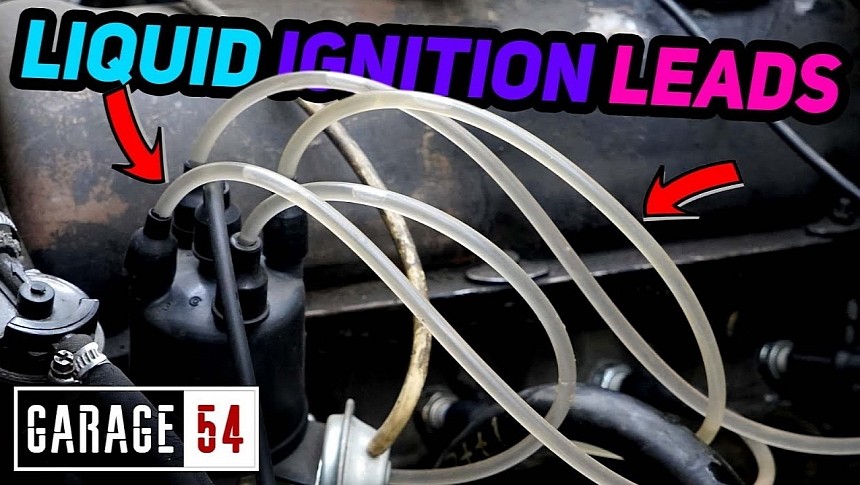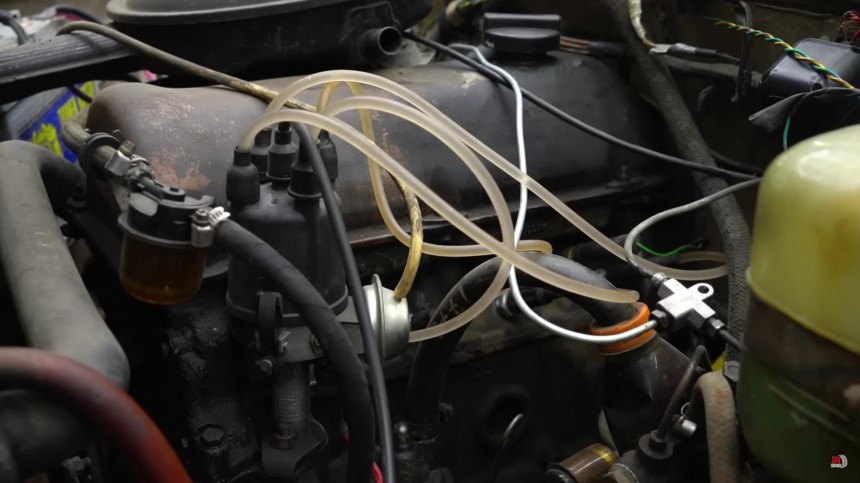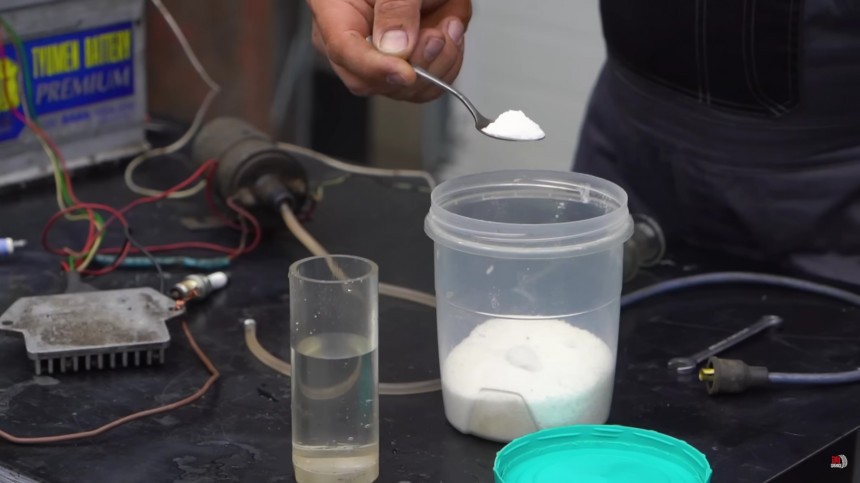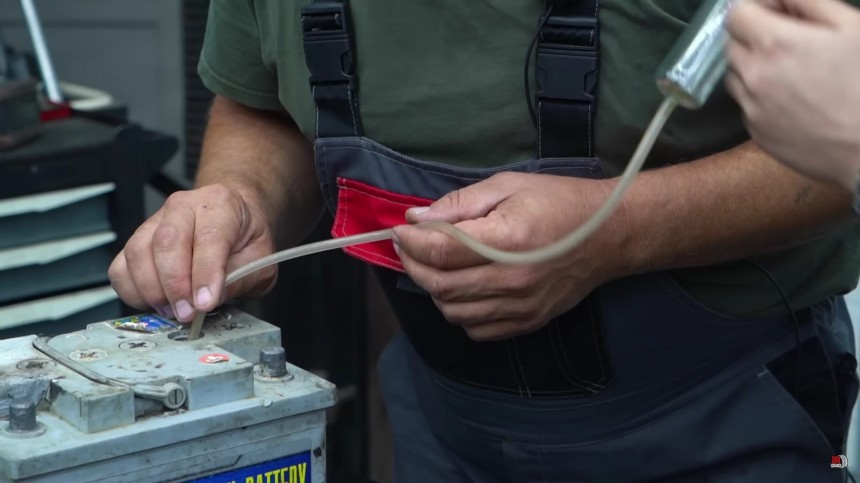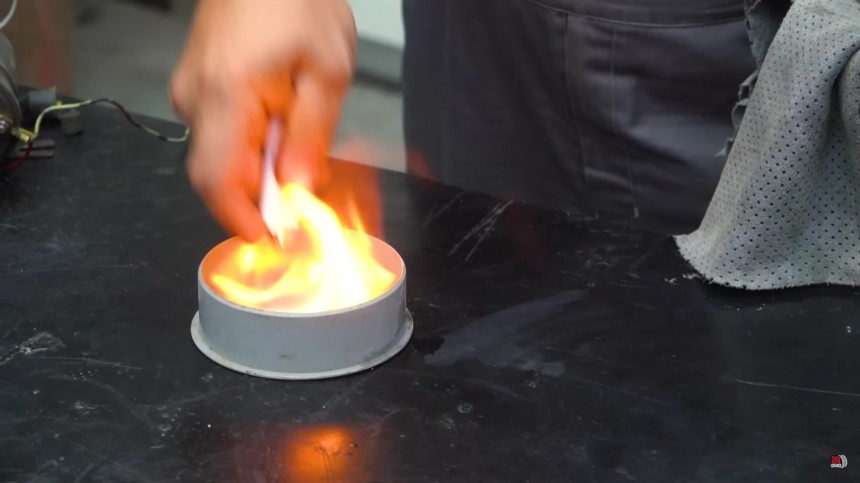“What happens when a car runs out of spark fluid?” is a question automotive engineering has yet to answer. The primary reason for this would be that nobody ever asked it. Until now – and what better place to provide solutions to problems no one has ever had than Russia?
The Garage 54 Siberian band of wrench U-turners are at it again, and this time their experiment features a rather against the current approach to mechanical practicality. We all know that a combustion engine that burns gasoline uses a distributor to sync the ignition inside each combustion chamber.
And we also know that the distributor sends a high-voltage current through a set of wires to the sparkplugs inside the cylinder heads. The electric discharge at the tip of the sparkplug sets the fuel-air mixture ablaze, and go-fast happens.
As we learned in school, electricity is generally carried from one point to another through strings of metal wrapped in an insulating coating. We usually refer to these as wires, cables, or leads – the latter is the term most commonly associated with the ignition system of a gasoline engine.
That would be the scientific approach to things. The tried and tested method. The correct way. The general-use practice in the carmaking industry. But the team from Garage 54 YouTubing mechanics decided – yet another time – that this is too mainstream and boring.
Why not use a hose instead of a metal conductor to carry electrical current to the sparkplugs? Not the gardening three-quarter-inch type, but a simple windshield washer fluid transparent tube. Since air isn’t a great electricity conductor, the Siberians replaced the conservative metal wires with liquids.
That’s right, plural – the Russian daredevils filled the hoses with various automotive liquids to see if an engine could run. Round one of testing put plain dihydrogen monoxide at the forefront of this makeshift automotive experiment. (If the substance doesn’t sound familiar, don’t panic; it’s more commonplace than anything else. In fact, look in the mirror – about 70% of what you see is that ubiquitous compound, generally referred to as “water”).
So, tap water for the win! Or fail, since plain H2O isn’t a great electricity friend – but do not take a bath with the hair dryer running on the bathtub’s edge! In the great Russian tradition of head-scratching innovation, the water-based distributor leads are installed on a Lada engine.
However, the idea is scrapped since the sparks aren’t strong enough to cause a fire inside the combustion chamber. I mean, the tap water proposition is disregarded. Still, elementary school science experiments have proven to many generations of curious minds that adding salt to water immediately augments the liquid’s capacity to conduct electricity.
No sooner said than done – a teaspoon of table salt lights the fire. The engine starts and runs great, thanks to the chemical properties of brine. The same result is achieved when salt water is replaced with windshield washer fluid, coolant, and battery electrolyte.
The sulphuric acid in the battery is excellent at letting electrons run free – that’s why it’s used in batteries – but it is also great at eating metals. The chemical reaction between the acid and the metal connectors at the end of the hose emits gases (the bubbles are visible inside the tubes).
The electrolyte is by far the coolest substance of choice – the spark-works are spectacular; we can literally watch electricity flowing through the leads. But, if current free-flows everywhere, very little is left to reach the sparkplug.
That’s the cause of the misfire that makes the Lada engine rattle like a tumbling stack of fire logs. (In all fairness, the sound is very similar to a regular, fully functional inline-four designed and built in the glorious days of the Soviet Union).
Finally, there’s one more fluid in every car that can be experimented with – and the Russians are quick to try it out: gasoline. But guess what? Gasoline does not conduct electricity – otherwise, the sending unit in the tank would short out and break down the moment you’d turn the key in the contact.
A side effect of this would be a big bright bang. As a precaution – we are talking about a highly flammable liquid, after all – the improvised scientists from Novosibirsk had a fire extinguisher handy. When it comes to Russian homemade scientific experiments, one can never be over-cautious.
And we also know that the distributor sends a high-voltage current through a set of wires to the sparkplugs inside the cylinder heads. The electric discharge at the tip of the sparkplug sets the fuel-air mixture ablaze, and go-fast happens.
As we learned in school, electricity is generally carried from one point to another through strings of metal wrapped in an insulating coating. We usually refer to these as wires, cables, or leads – the latter is the term most commonly associated with the ignition system of a gasoline engine.
Why not use a hose instead of a metal conductor to carry electrical current to the sparkplugs? Not the gardening three-quarter-inch type, but a simple windshield washer fluid transparent tube. Since air isn’t a great electricity conductor, the Siberians replaced the conservative metal wires with liquids.
That’s right, plural – the Russian daredevils filled the hoses with various automotive liquids to see if an engine could run. Round one of testing put plain dihydrogen monoxide at the forefront of this makeshift automotive experiment. (If the substance doesn’t sound familiar, don’t panic; it’s more commonplace than anything else. In fact, look in the mirror – about 70% of what you see is that ubiquitous compound, generally referred to as “water”).
However, the idea is scrapped since the sparks aren’t strong enough to cause a fire inside the combustion chamber. I mean, the tap water proposition is disregarded. Still, elementary school science experiments have proven to many generations of curious minds that adding salt to water immediately augments the liquid’s capacity to conduct electricity.
No sooner said than done – a teaspoon of table salt lights the fire. The engine starts and runs great, thanks to the chemical properties of brine. The same result is achieved when salt water is replaced with windshield washer fluid, coolant, and battery electrolyte.
The electrolyte is by far the coolest substance of choice – the spark-works are spectacular; we can literally watch electricity flowing through the leads. But, if current free-flows everywhere, very little is left to reach the sparkplug.
That’s the cause of the misfire that makes the Lada engine rattle like a tumbling stack of fire logs. (In all fairness, the sound is very similar to a regular, fully functional inline-four designed and built in the glorious days of the Soviet Union).
A side effect of this would be a big bright bang. As a precaution – we are talking about a highly flammable liquid, after all – the improvised scientists from Novosibirsk had a fire extinguisher handy. When it comes to Russian homemade scientific experiments, one can never be over-cautious.
